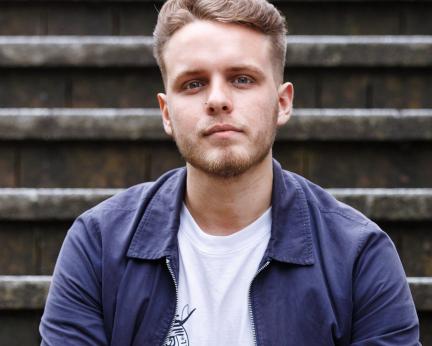"“Speech and language therapy combines the science of medicine with building meaningful human relationships. That’s why I love it”. "

Max Elswood
Speech and language therapist
- Employer or university
- Acute stroke unit in the South West
I knew that I wanted to do something in healthcare and I looked at a few different options. I came across many of the allied health professions, such as radiology and prosthetics, but chose speech and language therapy, mainly because of the wide variety the role offers. There is a breadth of career options and specialisms that can appeal to so many different people.
Working with adults with communication and swallowing problems can take many forms. You could be supporting someone after a stroke, head and neck cancer or motor neurone disease. You could also work in forensic mental health settings or in the justice system. Empowering people to communicate is something that really appealed to me as a career that is as challenging as it is rewarding.
I grew up wanting to be a vet but I did some work experience and realised that surgery is not for me! I knew I wanted to do something working with people as part of my job, preferably in a medical setting. When I was choosing my subjects at college, I kept my options open and chose subjects ranging from biology to English (which turned out to be the combination of subjects that exactly matched my career!).
Speech and language therapy combines the science of medicine with building meaningful human relationships. That’s why I love it. While the patient-facing aspect of the role is vital, writing is a huge part of the job. I really enjoy being able to express my clinical opinion to a clear and high standard for other healthcare professionals, auditors and researchers to easily understand.
I work on an acute stroke unit. Strokes are caused by an interruption of blood supply to the brain, and can often affect your ability to communicate and swallow. My role is to assess, educate and support people with communication and swallowing problems.
Communication difficulties after a stroke can be different for everyone. It can range from mildly slurred speech to a complete inability to make any speech sounds, understand any verbal information, or read and write. It’s important that I accurately make a diagnosis of the problem, so that I can make recommendations and design a therapy plan that is right for that person. A lot of my time is also spent supporting family members to understand their relative’s communication diagnosis and maximise a patient’s ability to communicate effectively with their family and friends.
My day starts with taking a list of all the patients on the unit who need my help . People who have come into hospital with a suspected swallowing problem are always the priority, as they often cannot eat or drink until I see them. I will assess their swallowing and work closely with them and their doctors to find the best way for them to get calories and hydration in, which is crucial after a stroke. This might be eating and drinking orally, or it might involve having a tube in their nose for a short time while I support their swallowing rehabilitation.
A hugely rewarding part of my role is the emotional support that I provide to patients and relatives. A stroke can mean a loss of something – whether that’s the ability to walk independently, to hug your children or grandchildren, to eat your favourite meal, or to tell your partner that you love them. The psychological support that we give to our patients to help them to redefine their identity after stroke is essential. It’s a whole team effort.
From my experience, I see the impact of my work very quickly. Communication is fundamental to people’s mental health and well-being, so the opportunity to be heard is a huge relief for my patients. Equally, I always love giving someone their first cup of tea since their stroke (I make a mean cup of tea). Having such an impact on someone’s quality of life makes me proud to be a speech and language therapist.
The other best bit for me is the teamwork. On the stroke ward, there are often more than nine professionals involved in the care of a single patient. Being able to talk openly with my colleagues about all aspects of their care, and how this directly relates to developing a discharge plan for a patient is one of my favourite parts of the job.
Speech and language therapy is never just speech and language therapy, because the nature of our job will always impact upon so many other aspects of patient care.
I’ve been on the acute stroke unit for 3 years now. I’ve still got a lot to learn, and I don’t picture myself leaving my current role any time soon. I love it too much!
I’m so grateful that my management team is supporting my career development. I’ve been awarded NIHR (National Institute of Health Research) funding to undertake a part-time Masters degree in Clinical Research. Having a foot in academia gives me the option to pursue academic career progression, as well as the more conventional career pathway in management.
My top tip for people who are thinking about studying speech and language therapy is do it. This is not a career choice that people often regret. I would recommend this career to anyone who wants to work in health, who likes writing and who is an excellent communicator.
There’s an underrepresentation of men and people from minority ethnic backgrounds in this field. The nature of this job involves supporting people from all cultures, and it is hugely important that our profession is sufficiently diverse to represent the patients that we work with. Bilingual and multilingual speakers are an asset to the profession. For this reason, I particularly encourage anyone from the above groups to pursue this fulfilling career.




